#Orpheus and Eurydice
Text
this is painland and nikocrystal btw
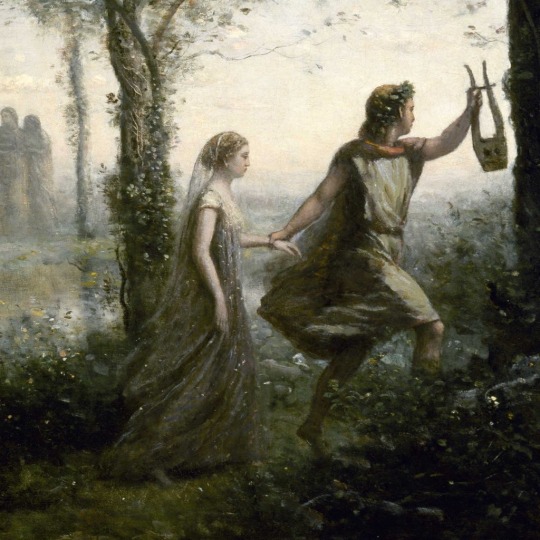
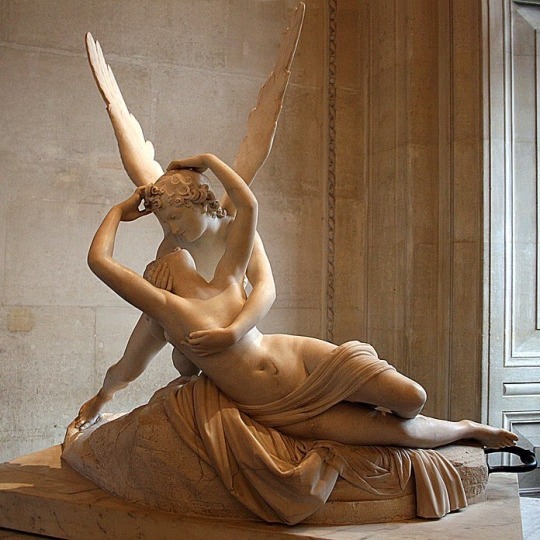
#dead boy detectives#painland#nikocrystal#paynland#orpheus and eurydice#eros and psyche#edwin payne#edwin paine#charles rowland#crystal palace#crystal palace surname von hovercraft#niko sasaki#the sandman#netflix
128 notes
·
View notes
Text
Charles makes the parallel to their story to Orpheus and Eurydice and Charles might be Orpheus in regards to Edwin.
But Edwin isn't Eurydice at all.
We can see throughout that episode that Edwin is Sysiphus.
Too smart for his own good, managing to cheat death twice using his cunning alone (the only reason Charles could save him was his detailed plan).
We see the exact same punishment Sysiphus got for Simon. Doing the exact same task over and over being promised freedom when it's over.
With Edwin not understanding the depth of despair that punishment puts him in.
And just like Sysiphus he won't cheat death a third time.
Next time he ends up in Hell it's permanent.
Or it would be but the fact that we see at the end of the episode that Simon (Sysiphus) can be redeemed means that Edwin can as well.
He has to give up on all the anger, hatred that he still holds against everyone that has wronged him that only hurts him in the end.
Charles gives himself the role of Orpheus because when it come to Edwin he loves him so much he would go to hell for him and ultimately he loves him so much he will always turn around when Edwin is hurting.
We see again and again Charles making snap decisions that he thinks are for the best that end up terribly (possessing the witch, hitting the bell etc.)
So Edwin when it is all said and done will have to save himself by letting go of the grudge he still keeps about his death
#dead boy detective spoilers#orpheus and eurydice#sysiphus#dead boy detectives theory#dead boy detectives
60 notes
·
View notes
Text
You know what would be an awesome crossover in the Underworld Saga?
What if off screen (…off-song?) Orpheus and Eurydice are actually guiding Odysseus and his men through the Underworld? Cause they’re both roaming the river Styx for eternity after their death. And they’d probably be rooting for him and Penelope.
#epic the musical#the underworld saga#nerd talks#odysseus#eurydice#orpheus#orpheus and eurydice#hadestown
20 notes
·
View notes
Text
145K notes
·
View notes
Text

― Ovid, Metamorphoses
9K notes
·
View notes
Text
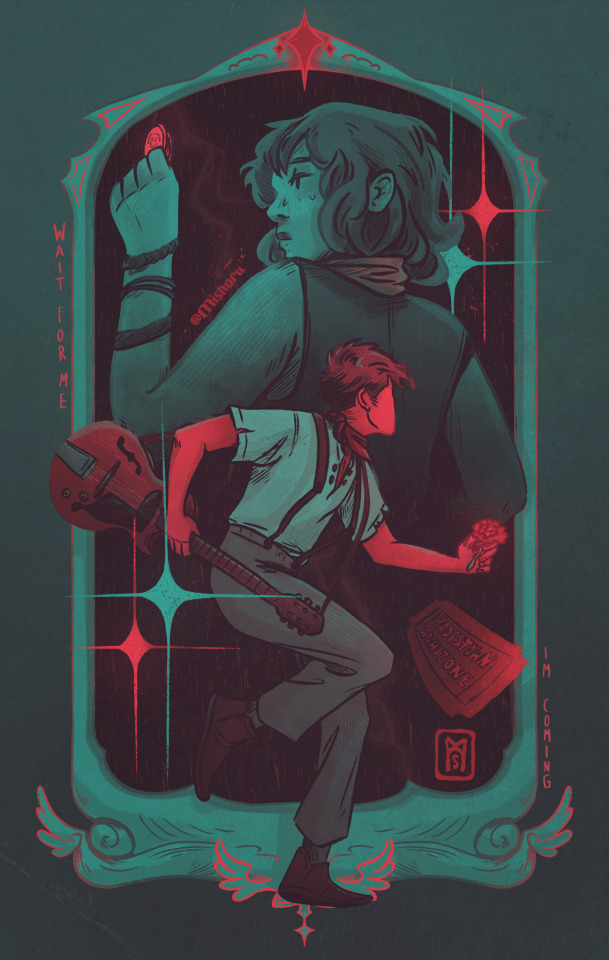
It's an old tale
#Hello tumblr I am alive#illustration#art#procreate#I haven't made new spn art but look at what I've been doing meanwhile#fanart#hadestown#orpheus#eurydice#hadestown fanart#orpheus and eurydice#orpheus and euridyce#orphydice#musical fanart#greek mythology#greek tragedy#greek gods
6K notes
·
View notes
Text
In the past I've shared other people's musings about the different interpretations of the myth of Orpheus and Eurydice. Namely, why Orpheus looks back at Eurydice, even though he knows it means he'll lose her forever. So many people seem to think they've found the one true explanation of the myth. But to me, the beauty of myths is that they have many possible meanings.
So I thought I would share a list of every interpretation I know, from every serious adaptation of the story and every analysis I've ever heard or read, of why Orpheus looks back.
One interpretation – advocated by Monteverdi's opera, for example – is that the backward glance represents excessive passion and a fatal lack of self-control. Orpheus loves Eurydice to such excess that he tries to defy the laws of nature by bringing her back from the dead, yet that very same passion dooms his quest fo fail, because he can't resist the temptation to look back at her.
He can also be seen as succumbing to that classic "tragic flaw" of hubris, excessive pride. Because his music and his love conquer the Underworld, it might be that he makes the mistake of thinking he's entirely above divine law, and fatally allows himself to break the one rule that Hades and Persephone set for him.
Then there are the versions where his flaw is his lack of faith, because he looks back out of doubt that Eurydice is really there. I think there are three possible interpretations of this scenario, which can each work alone or else co-exist with each other. From what I've read about Hadestown, it sounds as if it combines all three.
In one interpretation, he doubts Hades and Persephone's promise. Will they really give Eurydice back to him, or is it all a cruel trick? In this case, the message seems to be a warning to trust in the gods; if you doubt their blessings, you might lose them.
Another perspective is that he doubts Eurydice. Does she love him enough to follow him? In this case, the warning is that romantic love can't survive unless the lovers trust each other. I'm thinking of Moulin Rouge!, which is ostensibly based on the Orpheus myth, and which uses Christian's jealousy as its equivalent of Orpheus's fatal doubt and explicitly states "Where there is no trust, there is no love."
The third variation is that he doubts himself. Could his music really have the power to sway the Underworld? The message in this version would be that self-doubt can sabotage all our best efforts.
But all of the above interpretations revolve around the concept that Orpheus looks back because of a tragic flaw, which wasn't necessarily the view of Virgil, the earliest known recorder of the myth. Virgil wrote that Orpheus's backward glance was "A pardonable offense, if the spirits knew how to pardon."
In some versions, when the upper world comes into Orpheus's view, he thinks his journey is over. In this moment, he's so ecstatic and so eager to finally see Eurydice that he unthinkingly turns around an instant too soon, either just before he reaches the threshold or when he's already crossed it but Eurydice is still a few steps behind him. In this scenario, it isn't a personal flaw that makes him look back, but just a moment of passion-fueled carelessness, and the fact that it costs him Eurydice shows the pitilessness of the Underworld.
In other versions, concern for Eurydice makes him look back. Sometimes he looks back because the upward path is steep and rocky, and Eurydice is still limping from her snakebite, so he knows she must be struggling, in some versions he even hears her stumble, and he finally can't resist turning around to help her. Or more cruelly, in other versions – for example, in Gluck's opera – Eurydice doesn't know that Orpheus is forbidden to look back at her, and Orpheus is also forbidden to tell her. So she's distraught that her husband seems to be coldly ignoring her and begs him to look at her until he can't bear her anguish anymore.
These versions highlight the harshness of the Underworld's law, and Orpheus's failure to comply with it seems natural and even inevitable. The message here seems to be that death is pitiless and irreversible: a demigod hero might come close to conquering it, but through little or no fault of his own, he's bound to fail in the end.
Another interpretation I've read is that Orpheus's backward glance represents the nature of grief. We can't help but look back on our memories of our dead loved ones, even though it means feeling the pain of loss all over again.
Then there's the interpretation that Orpheus chooses his memory of Eurydice, represented by the backward glance, rather than a future with a living Eurydice. "The poet's choice," as Portrait of a Lady on Fire puts it. In this reading, Orpheus looks back because he realizes he would rather preserve his memory of their youthful, blissful love, just as it was when she died, than face a future of growing older, the difficulties of married life, and the possibility that their love will fade. That's the slightly more sympathetic version. In the version that makes Orpheus more egotistical, he prefers the idealized memory to the real woman because the memory is entirely his possession, in a way that a living wife with her own will could never be, and will never distract him from his music, but can only inspire it.
Then there are the modern feminist interpretations, also alluded to in Portrait of a Lady on Fire but seen in several female-authored adaptations of the myth too, where Eurydice provokes Orpheus into looking back because she wants to stay in the Underworld. The viewpoint kinder to Orpheus is that Eurydice also wants to preserve their love just as it was, youthful, passionate, and blissful, rather than subject it to the ravages of time and the hardships of life. The variation less sympathetic to Orpheus is that Euyridice was at peace in death, in some versions she drank from the river Lethe and doesn't even remember Orpheus, his attempt to take her back is selfish, and she prefers to be her own free woman than be bound to him forever and literally only live for his sake.
With that interpretation in mind, I'm surprised I've never read yet another variation. I can imagine a version where, as Orpheus walks up the path toward the living world, he realizes he's being selfish: Eurydice was happy and at peace in the Elysian Fields, she doesn't even remember him because she drank from Lethe, and she's only following him now because Hades and Persephone have forced her to do so. So he finally looks back out of selfless love, to let her go. Maybe I should write this retelling myself.
Are any of these interpretations – or any others – the "true" or "definitive" reason why Orpheus looks back? I don't think so at all. The fact that they all exist and can all ring true says something valuable about the nature of mythology.
#mythology#greek mythology#orpheus#eurydice#orpheus and eurydice#analysis#interpretations#adaptations#long
23K notes
·
View notes
Text
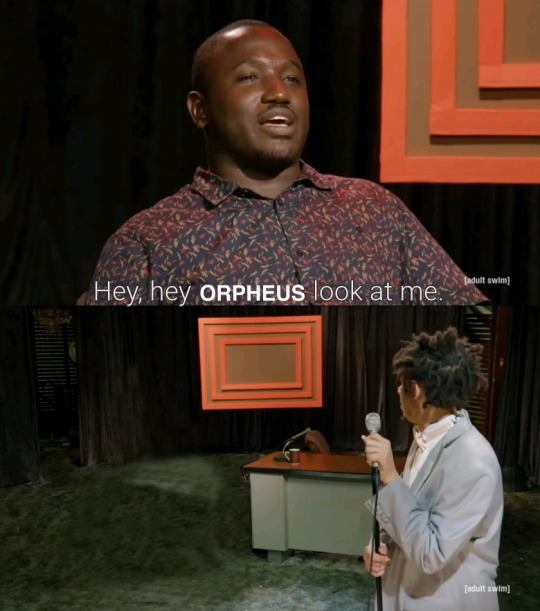
Has this been done yet
83K notes
·
View notes
Photo









Orpheus and Eurydice by Tyler Miles Lockett
3K notes
·
View notes
Text
obsessed with stories where the message is that you can't bring someone back from the dead even if you can bring someone back from the dead
#the ones where people come back from the dead *to tell their loved ones they cant come back from the dead*...#orpheus and eurydice#iliad 23#alcestis#the set of songs that includes the unquiet grave and sweet williams ghost and lowlands away and the two brothers#mine
96K notes
·
View notes
Text
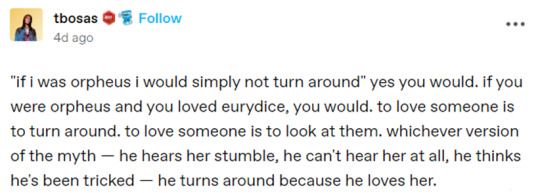


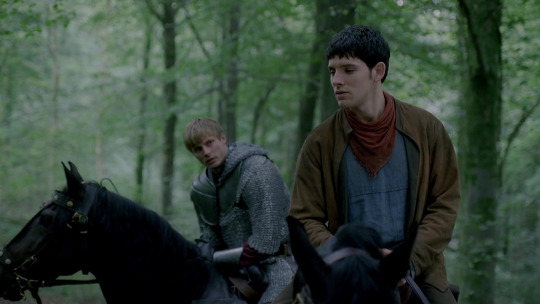
this post & merthur
#sami rambles#our favourite doomed couple <333#i will always and forever remember hearing sara bareilles' orpheus for the first time as a teenager and immediately and irrevocably#linking it to merthur for the rest of my natural life so much so that i can no longer separate the two#LOL :D#merlin#bbc merlin#arthur pendragon#merlin x arthur#merthur#web weave#orpheus and eurydice
4K notes
·
View notes
Text
If you see this in the wild please reblog the following version instead:
#greek mythology#orpheus#eurydice#orpheus and eurydice#yes i just relistened to hadestown. how *hopeful* she sounds right before he turns around;;;;; dhshsjshgsgsg#poll
975 notes
·
View notes
Text


orpheus + eurydice / kaz + inej
892 notes
·
View notes
Text
To know how it ends and still begin to singing it again as is if…

It might turn out this time
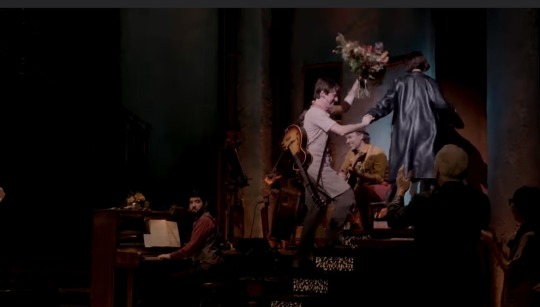
Reeve Carney’s Orpheus finally succeeded in walking Eva Noblezada’s Eurydice out of Hadestown.
1K notes
·
View notes
Text
not normal about orpheus and eurydice. you loved someone so much it opened the stones of the underworld. so much that death had to listen. so much that everything stopped for your love. so much that you turned around. so much that even when you did wrong. she forgave you.
#orpheus and eurydice#hadestown#maybe#maybe not#greek mythology#mythology#i think loving someone that much is the most human thing you can do#i think that’s what it means to be a person#not romantically#not necessarily. even a friend. a family member#orpheus#eurydice#hades#persephone#shrike speaks#taking back what i said about love making you human. it doesn’t#but i think it’s a beautiful experience.#so. much happiness is wished upon the loveless aspecs i spoke to a while back :)
655 notes
·
View notes
